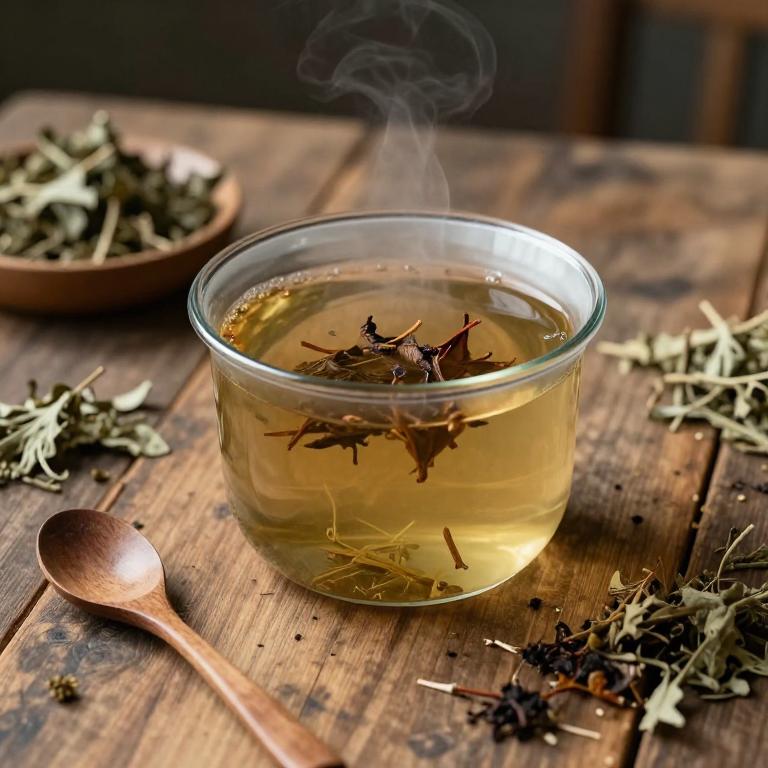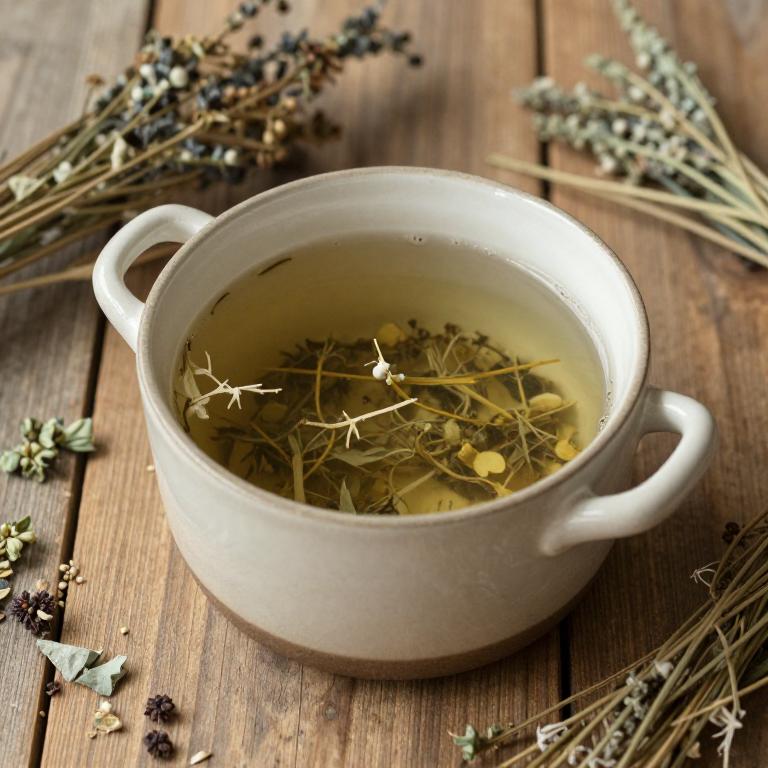10 Best Herbal Decoctions For Bruises

Herbal decoctions have been traditionally used to alleviate the symptoms of bruises by promoting circulation and reducing inflammation.
Common herbs such as nettle, yarrow, and chamomile are often included in these decoctions due to their anti-inflammatory and healing properties. To prepare a decoction, the dried herbs are typically simmered in water for an extended period to extract their active compounds. Applying the warm decoction to the affected area can help soothe pain and speed up the recovery process.
While generally safe, it is advisable to consult a healthcare professional before using herbal remedies, especially for severe or persistent bruises.
Table of Contents
- 1. St. john's wort (Hypericum perforatum)
- 2. Yarrow (Achillea millefolium)
- 3. Dog rose (Rosa canina)
- 4. Stinging nettle (Urtica dioica)
- 5. Marigold (Calendula officinalis)
- 6. Chaste tree (Vitex agnus-castus)
- 7. Common plantain (Plantago major)
- 8. Thistle (Silybum marianum)
- 9. English lavender (Lavandula angustifolia)
- 10. Field horsetail (Equisetum arvense)
1. St. john's wort (Hypericum perforatum)

Hypericum perforatum, commonly known as St. John's Wort, is traditionally used in herbal medicine for its anti-inflammatory and wound-healing properties.
When prepared as a decoction, the plant's active compounds, such as hypericin and hyperforin, can be extracted to create a potent remedy for bruises. This decoction is often applied topically to reduce swelling, pain, and discoloration associated with bruising. The anti-inflammatory effects of hypericum perforatum help promote healing by improving circulation and reducing oxidative stress in the affected area.
While generally safe for external use, it is important to consult a healthcare professional before applying it to open wounds or using it internally.
2. Yarrow (Achillea millefolium)

Achillea millefolium, commonly known as yarrow, has been traditionally used in herbal medicine for its potential to aid in the healing of bruises.
The plant contains compounds such as flavonoids and essential oils, which are believed to have anti-inflammatory and hemostatic properties. A herbal decoction of yarrow can be prepared by steeping the dried leaves and flowers in hot water, creating a potent infusion. This decoction is often applied topically to the affected area to reduce swelling and promote blood absorption.
While generally considered safe, it is advisable to consult a healthcare professional before using yarrow, especially for those with known allergies or on medication.
3. Dog rose (Rosa canina)

Rosa canina, also known as dog rose, has been traditionally used in herbal medicine for its potential healing properties, including the treatment of bruises.
The herbal decoction of Rosa canina is prepared by simmering the dried flowers and fruits in water, creating a potent infusion that is believed to promote circulation and reduce inflammation. This decoction is thought to support the body's natural healing process by enhancing blood flow to the affected area, which can help in the reduction of bruising and swelling. It is often recommended for minor bruises, sprains, and contusions due to its mild antiseptic and astringent properties.
While it is generally considered safe, it is advisable to consult with a healthcare professional before using Rosa canina decoctions, especially for more severe injuries or in individuals with known allergies.
4. Stinging nettle (Urtica dioica)

Urtica dioica, commonly known as stinging nettle, has been traditionally used in herbal medicine for its potential healing properties, including the treatment of bruises.
A decoction of urtica dioica can be prepared by simmering the dried leaves and stems in water for several minutes, allowing the active compounds to be extracted. This herbal remedy is believed to help reduce inflammation and promote circulation, which may aid in the healing process of bruises. The high concentration of silica and antioxidants in stinging nettle may contribute to its effectiveness in supporting tissue repair.
However, it is important to consult with a healthcare professional before using urtica dioica, especially for individuals with known allergies or those taking other medications.
5. Marigold (Calendula officinalis)

Calendula officinalis, commonly known as pot marigold, has been traditionally used in herbal medicine for its anti-inflammatory and wound-healing properties.
When prepared as a decoction, calendula can help reduce swelling and promote the healing of bruises by enhancing circulation and tissue repair. The active compounds in calendula, such as flavonoids and triterpenes, contribute to its ability to soothe inflamed tissues and prevent further bruising. To make a decoction, dried calendula flowers are simmered in water for several minutes, then strained and applied topically to the affected area.
This natural remedy is often preferred for its gentle yet effective action on the skin, making it a popular choice for minor injuries and bruising.
6. Chaste tree (Vitex agnus-castus)

Vitex agnus-castus, commonly known as chaste tree, has been traditionally used in herbal medicine for its potential healing properties.
Herbal decoctions made from vitex agnus-castus are believed to support the body's natural healing processes, particularly in reducing inflammation and promoting tissue repair. While there is limited scientific research specifically on its use for bruises, some studies suggest that the plant's phytoestrogens and flavonoids may contribute to improved circulation and reduced swelling. These decoctions are often prepared by simmering the dried berries in water for several hours to extract the active compounds.
As with any herbal remedy, it is important to consult with a healthcare professional before use, especially for those with underlying health conditions or taking other medications.
7. Common plantain (Plantago major)

Plantago major, commonly known as broadleaf plantain, has been traditionally used in herbal medicine for its soothing and healing properties, particularly for treating bruises.
Its leaves contain compounds such as aucubin and allantoin, which are believed to promote tissue repair and reduce inflammation. To prepare a decoction, the dried leaves are simmered in water for several minutes, then strained and applied topically to the affected area. This herbal remedy is often favored for its mild nature and accessibility, making it a popular choice in natural health practices.
While it may not replace professional medical care for severe injuries, it can serve as a supportive treatment for minor bruising and soft tissue damage.
8. Thistle (Silybum marianum)

Silybum marianum, commonly known as milk thistle, is a herbal remedy that has been traditionally used for its potential hepatoprotective properties.
While it is primarily studied for liver health, some research suggests that its active compound, silymarin, may also have anti-inflammatory and antioxidant effects that could aid in the healing of bruises. Herbal decoctions made from silybum marianum are often prepared by steeping the dried seeds in hot water, creating a tea that may be consumed internally or applied topically. However, there is limited scientific evidence specifically supporting its use for treating bruises, and more research is needed to confirm its efficacy in this context.
As with any herbal remedy, it is advisable to consult a healthcare professional before use, especially for individuals with existing medical conditions or those taking medications.
9. English lavender (Lavandula angustifolia)

Lavandula angustifolia, commonly known as English lavender, has been traditionally used in herbal medicine for its soothing and anti-inflammatory properties.
Herbal decoctions made from dried lavender flowers are often prepared by simmering the plant material in water, allowing the active compounds such as linalool and linalyl acetate to be extracted. These decoctions are applied topically to bruises to help reduce swelling, promote healing, and alleviate pain due to their mild antiseptic and analgesic effects. The calming aroma of lavender also has a soothing effect on the mind, which can aid in the overall recovery process.
While generally safe for external use, it is important to ensure that the skin is not sensitive or allergic to lavender before applying the decoction.
10. Field horsetail (Equisetum arvense)

Equisetum arvense, commonly known as field horsetail, has been traditionally used in herbal medicine for its potential healing properties, particularly for bruises.
The herb contains high concentrations of silica, which is believed to support tissue repair and reduce inflammation. To prepare a decoction for bruises, the dried leaves are simmered in water for about 20 minutes, then strained and applied topically. This preparation is thought to promote circulation and aid in the absorption of bruised tissues.
While some studies suggest its efficacy, it is important to consult a healthcare professional before using it, especially for severe or persistent injuries.